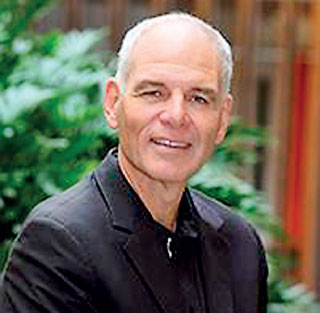Reflecting on ‘responsible science’: Reality through research in focus

Overcoming the barriers and moving from an individualistic approach to more of an interactive approach will pave way for higher vibrancy of research in Sri Lanka. It requires reflections and resolutions towards results
Monday, 29 November 2021
|
Bond University, Australia Prof. Robert Faff
|
Has science gone wrong? Are we not using it properly? Why does science matter in relation to data-driven decisions? Sri Lanka is baffling with many challenges in its socio-economic front and a scientific approach with needed pragmatism should provide answers. Yet are our egos ready to accept them? Today’s column reflects on such pertinent aspects with special reference to ‘responsible science’.
Overview
It was heartening to be the co-chairperson of PIMARC 2021, the annual research conference of the Postgraduate Institute of Management (PIM). With the apt theme of ‘reflecting reality through research’, it included a national ‘pitching’ competition for the first time in Sri Lanka to select an eligible doctoral candidate for the global ‘pitching’ award.
Prof. Robert Faff of the Bond University of Australia, being the pioneer of the ‘pitching’ competitions, was the keynote speaker. ‘Pitching’ is used in the research context as the way of producing a precise, specific, comprehensive yet concise research proposal in a structured manner based on a standard format. Today’s column contains the salience of his thought sharing on responsible science with implications to Sri Lankan context.
Prof. Robert Faff spoke mainly of responsible science, where data-driven decisions without fear or favour must be backed by evidence. Information and intuition both should be involved in such a way forward with insightful action in line with an inspiring vision. His presentation was an essence of one of his recent publications titled, ‘Responsible Science Matters’.
Responsible science
As the way Prof. Faff shared, research is defined (according to the Australian Research Council), as: “… the creation of new knowledge and/or the use of existing knowledge in a new and creative way to generate new concepts, methodologies, inventions and understandings. This could include synthesis and analysis of previous research to the extent that it is new and creative.”
For current purposes, ‘research equals science’ and ‘science equals research’, and in his view, science is inextricably linked to the creation of new knowledge. But, that said, we must recognise at least three notable things around knowledge creation, observes Prof. Faff.
(1) First, is that new knowledge can be created in ways that (at least initially) don’t involve research or science – though, such scenarios are relatively rare, likely serendipitous and largely unpredictable. Given the huge ‘luck’ element is this type of situation, while we can and should be thankful for such breakthroughs, they are not greatly amenable to a strategic approach or systematic effort.
(2) Second, related to the first point, there could well be an important phase of follow up science/research that adds important elements of rigor and ‘causality’ to ensure critical demonstration of safety, reliability, and resilience in applying such lucky breakthroughs to deliver real world benefits.
(3) The third thing to note, is the reality that not all science is equal … there is ‘good’ science …, but, unfortunately, there is also ‘bad’ science.
Of course, we should always strive for good science … but what are ‘markers’ of good science? Prof. Faff suggests the following, non-exhaustive list.
- Good science – is objective and open-minded (passion about the question not the answer).
- Good science – searches for the unobservable ‘truth’ about how the world works.
- Good science – recognises that the world is unbelievably complex.
- Good science – is informed by theory (favouring causality over correlation).
- Good science – recognises that theory/models are necessarily simplifications or abstractions of reality.
- Good science – is often framed around tests of falsifiable hypothesis(es), that we can reject or fail to reject ‘but’ that we cannot ‘prove’ anything.
- Good science – is constrained by many things including noise, uncertainty, concepts vs. empirical constructs (proxies).
- Good science – is about documenting findings in terms of probabilistic statements about the unknown ‘truth’ of the hypotheses – so, researchers draw inferences based on the (likely weight of) evidence.
Given the above, what are some incidental ‘markers’ of Responsible Science? Prof. Faff provides a few suggestions of what we should see in a setting typified by responsible science:
- ‘Good’ science.
- A true ‘contest of ideas’.
- Avoidance of twisted/contorted narratives.
- Genuine recognition of the fact that ‘the science’ is never ‘settled’.
- A distinct lack of emotion.
- No bullying.
- No advocacy.
- The question is paramount/the answer is ‘what it is …’.
Credible, relevant and independent research
According to Prof. Faff, as the foundational primary pillar of responsible science, ‘credible research’ delivers reliable knowledge. It includes, valuing both basic and applied contributions, valuing plurality and multidisciplinary collaboration and a sound methodology.
It is instructive to explore some alternative perspectives on credible research as an arm of responsible science. To this end, a good way of organising our thinking is around the well- known ‘inputs-process-outputs’ cycle.
As Prof. Robert says, a key second pillar of responsible science, relevant research delivers useful knowledge. It includes service to society, stakeholder involvement, impact on stakeholders and broad dissemination. He highlights five broad areas of ‘relevance’ that they propose as deserving of increased focus by academic researchers:
1. Broader impact of firms on stakeholders.
2. Future of work, interaction with consumers.
3. Social sustainability of businesses.
4. Environmental sustainability.
5. Poverty, prosperity and economic inequality.
As a key third pillar of responsible science, independent research aims to deliver unbiased knowledge, from a researcher point of view, says Prof. Faff. However, the concept of independence is troublesome – to say the least. As he observes further, what we learn from professions like Auditing is that the goal of ‘independence’ is not one-dimensional – it is not simply about being independent. Actual independence, by itself, is insufficient because human behaviour is unreliable and, sadly, we cannot trust everyone to be honest! Moreover, in many cases external observers have great difficulty verifying actual independence. Hence, the additional dimensions of perceived independence and potential independence also need to be acknowledged, understood, and seriously considered.
Challenges of research
Prof. Robert Faff offers somewhat ‘eclectic’ ideas to ponder regarding the ever-present challenge of doing an efficacious job of dealing with the independence pillar of responsible science.
First, each researcher needs to make a serious effort to assess their own personal independence and to couch this within an honest appraisal of their values/beliefs/world view that identify areas of their own ‘faith’. Such items of ‘faith’ almost certainly will have ‘deal breaker’ consequences for the ‘safe’ and proper choice of research paradigms, research topics and research questions.
As individual researchers we should be more careful in our research practices, guarding against major threats to responsible science under our own watch, warns Prof. Faff. Be self-aware of the subtle ‘creep’ from sporadic/occasional soft misconduct, to repeated systematic instances of the same soft behaviours. In other words, always strive to make good decisions on research design, to ‘front end’ these decisions as much as possible and stick with your design as much as possible.
In those cases where you feel the legitimate need to depart from the original plan, judge whether such analysis can still be truly presented as ‘confirmatory’, or more likely whether (and at what stage) it should be seen as (and written up as) ‘exploratory’ analysis. Yes, this amounts to documentation honesty, when it comes to the time of writing up your study.
Comprehending the research ecosystem
Prof. Faff invites us to imagine the isolated actions of single individuals, given the existing research ecosystem. These isolated actions will fail, essentially because as single-case actions, they will likely suffer significant reputation discounts, relative to their major research competitors who hold their ground. For example, imagine the ‘visionary’ Business School Dean who adopts some policies that encourage researchers to swim against the tide e.g., rewarding quality research that does not hit the elite journals. It is likely, that the reputation of this school will drop, because the mode of assessing the quality of the school has not changed.
Likewise, for the ‘visionary’ journal editor who e.g., decides to create a new type of article on replications, observes Prof. Faff. Because replication studies are viewed as a lower quality output, this journal will quietly likely suffer a reputation hit, most obviously reflected in a lower citation rate and a consequential lower impact factor. As a final example, the ‘visionary’ individual researcher will risk a fall in their personal research reputation. This last case is quite perverse since, what the individual researcher is doing is aligning more closely with the principles of responsible science, and so should be seen as enhancing their reputation.
The problem while complex and multi-faceted, critically is handicapped by information asymmetry (it is very difficult for external observers to distinguish good research from bad research practices), in an environment that rewards too much based on ‘where did you publish’, rather than critical things like:
- how did you go about executing your study?
- does your study focus on a BIG important question? and
- what do we learn (irrespective of whether it turned out to be statistically significant or not)?
As Prof. Faff clearly emphasised, in the current research ecosystem, ‘loners’ can’t win. Coordinated/systemic change is what is needed.
Relevance to Sri Lanka
Whilst positive initiatives are being taken, the current situation with respect to research in Sri Lanka needs to move to a satisfactory level. What Prof. Jaya Pinikahana, a veteran researcher stated some time ago makes sense here. “It is time to deviate from traditional concept of university research and establish some links with the industry, both public and private for collaborative research.” The need to take data driven decisions with proper research rigour is often highlighted in the Sri Lankan context.
We saw that in the case of Chronic Kidney Disease (CKD) issue that cropped up several years ago. We saw that in the ongoing debate on organic vs. chemical fertilisers. Also, in the field of energy, the sustainability through green energy sources vs. continuation with fossil fuel is another stormy issue. All these highlight the need to engage in ‘responsible science’ as advocated by Prof. Robert Faff.
“Research is to see what everybody else has seen, and to think what nobody else has thought.”, so said Albert Szent-Gyorgyi, a Nobel Prize winning Hungarian psychologist. It is, in fact, developing a third eye to see beyond what is obvious. In many fields including management in Sri Lanka, both private and public sectors alike can immensely benefit if more insights beyond mere information would be the norm in making policy decisions.
Way forward
Research in all disciplines have a long way to go in ensuring the consistent reaching the unreached. With awareness of the content, and familiarity of the contents, the committed conduct with clarity and coherence is what is required. Overcoming the barriers and moving from an individualistic approach to more of an interactive approach will pave way for higher vibrancy of research in Sri Lanka. It requires reflections and resolutions towards results. Committing to ‘responsible science’ is a proven way of ensuring credible and applicable research.
(Prof. Ajantha Dharmasiri, former Director of Postgraduate Institute of Management, can be reached through ajantha@pim.sjp.ac.lk, ajantha@ou.edu or www.ajanthadharmasiri.info.)




No comments:
Post a Comment
Note: only a member of this blog may post a comment.